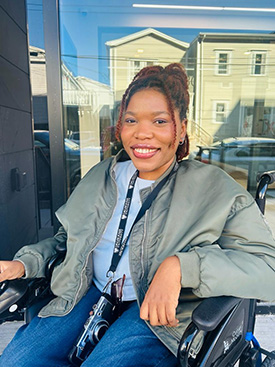This article is part of a series focusing on the grads of the Dalhousie Class of 2024. Spring Convocation runs from May 21 to 31 in Halifax and Truro. Read all our profiles here in one place as they are published, and for more information visit the Convocation website.
 Master of Planning graduate Yaba Osifo exemplifies the dedication needed to create inclusive environments that leverage Geographic Information System (GIS) technologies for spatial planning. Rooted in her unwavering passion for accessibility in the built environment, Yaba's journey is marked by both academic rigour and personal conviction.
Master of Planning graduate Yaba Osifo exemplifies the dedication needed to create inclusive environments that leverage Geographic Information System (GIS) technologies for spatial planning. Rooted in her unwavering passion for accessibility in the built environment, Yaba's journey is marked by both academic rigour and personal conviction.
With a background in geography and spatial planning and an academic foundation in regional planning, Yaba brings a comprehensive understanding of the intersections between space, society, and accessibility. Her experience as a person with a disability has fueled her commitment to fostering inclusive spaces.
Yaba's advocacy extends beyond theoretical frameworks; she actively engages with communities, recognizing the invaluable insights gained from consulting individuals with lived experiences. 
"No one knows how to address a problem better than a person who has lived it," she says. 
As a researcher for the PEACH Research Unit, she champions the voices of underrepresented groups, emphasizing the importance of understanding the "why" behind accessibility challenges. Through her work, she underscores the profound impact that seemingly minor adjustments, like a doorknob tweak, can have on the lives of marginalized people.
Navigating the built environment with a motorized wheelchair, Yaba intimately understands the mental load of accessibility considerations. 
"You have to think about all the 'what-ifs' when navigating from location to location," explains Yaba. "Such as whether a place has an elevator or not." 
Creating change
Her advocacy extends to all of the diverse challenges that people with disabilities face, such as the constant concern over the battery life of a motorized chair, to the logistical complexities of navigating spaces without proper accommodations.
Driven by her undergraduate experiences, where she observed the deliberate exclusion of marginalized communities in urban planning, Yaba embarked on her master's journey with a clear mission: to effect change. Joining forces with the PEACH Unit, she delved into diverse planning initiatives, honing her skills in community engagement, research and GIS analysis.
Yaba's dedication culminated in her forthcoming presentation at the 6th International Conference on Architecture, Research, Health, and Care in Finland. Her paper, "Addressing Barriers in the University Campus Environment for Neurodivergent Students," stands as a testament to her commitment to actionable change and her ability to bridge academic research with real-world impact.
Yaba's talent, compassionate advocacy for inclusive design, and personal journey are testaments to the transformative power that education plays in shaping more equitable futures.
